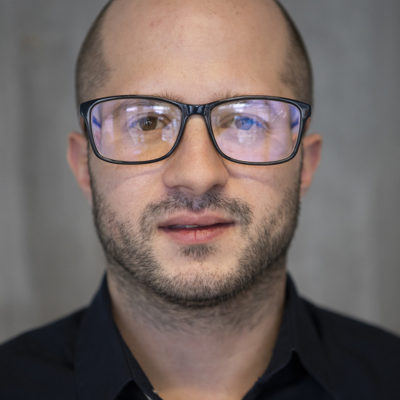Report Data-Date: Legal Tech 'What's the story?'
29.04.2022
Our society is becoming increasingly digitalised. This evolution is also applicable to the legal profession. Legal tech helps to manage this digital transition and aims to facilitate internal processes and improve efficiency. However, this poses several challenges. We invited four prominent speakers with different backgrounds and views to discuss the opportunities and obstacles.
The following experts joined the debate:
- Annelies Vanderhoydonks (Product Owner Automatic advice & Documentation service - Digitaal Vlaanderen)
- Senne Mennes (co-founder ClauseBase)
- Jan Sap (CEO Fednot)
- Genevieve Vanderstichele (Judge Court of Appeal Ghent and academic researcher CiTiP and University of Oxford)
MAGDA platform (Annelies Vanderhoydonks)
Annelies Vanderhoydonks kicked off the panel. She works as product owner for Digitaal Vlaanderen. Within the MAGDA Platform (maximale gegevensdeling tussen administraties), she is responsible for ‘Automatisch Advies’. This service allows not only to share data easily, but also to deliver an interpretation, an advice with respect to the data at stake. In this way, Flemish administrations and local authorities are enabled to automate and optimise any of their processes involving data and business logic. Although the advice is rendered automatically, it is not the intention to provide direct legal binding advice. It is still up to the end-user (the relevant government and administrations) to make the decision. Other safeguards in the process are the deletion of all data, including the advice, and the storage of data within European data centers.
Document automation software (Senne Mennes)
Senne Mennes was the second speaker. He is the co-founder of ClauseBase, a legal tech startup that provides some of the most powerful document automation software on the market. His decision to co-found ClauseBase stems from having contributed to the legal sector’s tradition of manual drafting and from being determined to contribute to the new way of working. He talked about how he approached this legal tech solution from his legal background. The idea was to create a tool that allows legal professionals to focus on the creative side of their work, rather than on the production side, i.e. spending most of the time on drafting contracts instead of struggling with text editors. The tool allows users to store collections of clauses in a clause library so that they can quickly retrieve the right content. It also allows users to create automated templates which can be used to generate documents by answering a list of questions.
Digitalisation of notary profession (Jan Sap)
Our third speaker was Jan Sap. He is CEO of Fednot, which is the national federation of notaries. Many employees at Fednot work on IT-applications for notaries. He discussed the digitalisation of the notary profession, which started in the 2000s. It can be divided in three waves. The first wave was the creation of a network between the federation and the notaries, the e-notariaat, used by all notaries and their employees. The second step was creating communication channels with public authorities, for instance e-depot (for creating a company). The last wave focuses on digital applications for citizens, where the best-known example is probably Biddit (online platform for buying & selling houses via auction). A recent initiative is Izimi. It is a digital vault for citizens in which they can store all their important documents, for instance authentic notary deeds.
Complexity of the judiciary (Genevieve Vanderstichele)
Our final speaker, Genevieve Vanderstichele, is a judge in the court of appeal of Ghent (business law section) with leave of absence to read for a Doctor of Philosophy in Law at the University of Oxford on 'Augmented adjudication. The role of the human judge in a digital society'. She is also an affiliated researcher at KU Leuven CiTiP and at VUB-LSTS (within COHUBICOL). She noted that the digitalisation exercise in the judiciary is quite complex. The former minister of Justice in Belgium was very active and the current minister is on the same track as well, thereby involving the judiciary. The complexity stems from the wide range of tasks in the judiciary. All courts have different links to society and have different kinds of data. The focus of research at the moment lies on the use of Machine Learning and National Language Processing, and their impact on the role of the (human) judge. Many initiatives are being adopted worldwide. Brazil, for instance, has an enormous judiciary backlog and there is currently a framework to allow courts to take their own initiatives with machine learning to improve this. The Brazilian Supreme Court has an automated tool to assess the admissibility of a request to introduce a case before the Court. She also raised a very important question:
To what extent do we want privatisation of the tools of the judiciary? Do we develop solutions for the judiciary within the government or do we outsource these solutions to private companies?
Debate and questions
After the panel discussion, members of the audience were invited to submit their own thoughts and questions. The question of digital inclusion is important with regard to the increasing digitalisation of our society. How do we make sure that people without any digital skills are not negatively affected by the digitalisation? This is not an easy task and is a relevant concern for both the notaries and the judiciary.
Technology is also often introduced as offering the magical answer to every problem. However, it sometimes overcomplicates things and the end-user may end up being more confused.
Another question related to the need for legal professionals to have a technical background as well (e.g. coding knowledge). Our panelists agreed that this is not necessary as such but ultimately depends on the goal you want to achieve. It may in some cases also be interesting to have neither background, as this can provide a new and fresh perspective on a topic or problem. The common thread throughout the discussion was the need for a balancing of interests, which is often a very difficult exercise and which should be done on a case-by-case basis.
